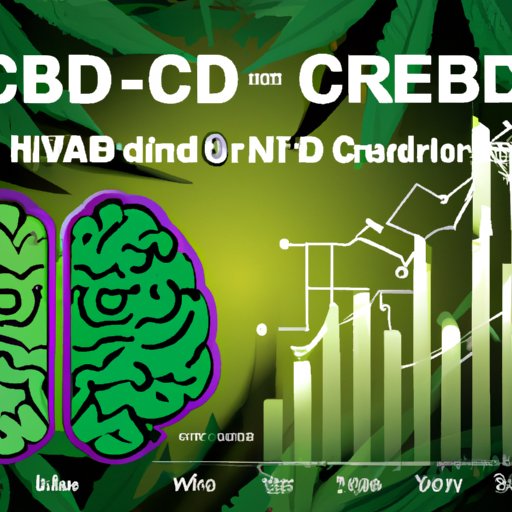I. Introduction
Cannabidiol (CBD) has been gaining popularity in recent years for its potential therapeutic benefits, particularly in the treatment of anxiety, depression, and neurological disorders. But how exactly does CBD affect the brain? In this article, we’ll explore the science behind CBD and its impact on cognitive processes, mood regulation, and the stress response. This article is intended for those who are curious about CBD and its effects on the brain, as well as those who are considering using CBD as a potential treatment for specific conditions.
II. The science behind CBD and its impact on cognitive processes
CBD is a non-intoxicating compound found in the cannabis plant. It interacts with the body’s endocannabinoid system, a complex cell-signaling system that helps regulate various bodily functions, including memory, mood, pain sensation, and appetite, among others.
Research has shown that CBD can affect various cognitive processes, including memory, attention, and learning. Studies have found that CBD may enhance hippocampal neurogenesis, the process by which new neurons are generated in the hippocampus, which is a region of the brain involved in learning and memory.
Furthermore, CBD has been found to inhibit the breakdown of anandamide, an endocannabinoid that plays a role in memory and learning.

III. Breaking down the brain chemistry of CBD: How it works and what it does
CBD interacts with two main cannabinoid receptors in the brain: CB1 and CB2 receptors. CB1 receptors are primarily found in the brain and central nervous system, while CB2 receptors are primarily found in the immune system and peripheral tissues.
CBD is thought to modulate the CB1 receptor, which helps regulate various processes in the brain, including mood, memory, and pain perception. It’s also been found to stimulate the CB2 receptor, which is involved in regulating inflammation.
Additionally, CBD has been found to affect various neurotransmitters in the brain, including serotonin and dopamine, which are involved in regulating mood, appetite, and sleep.
IV. A new way to manage stress? Understanding how CBD interacts with the brain’s stress response
Stress can have a significant impact on the brain and body, contributing to various mental and physical health problems. The hypothalamus-pituitary-adrenal (HPA) axis is a key stress response system in the body, and it’s been found that CBD can interact with this system.
Research has shown that CBD can reduce the production of cortisol, a stress hormone that can have damaging effects on the body when produced in excess. Additionally, CBD has been found to stimulate the release of certain neurotransmitters, including serotonin and gamma-aminobutyric acid (GABA), which can have calming and relaxing effects on the brain.
Studies have investigated CBD as a potential treatment for stress and anxiety disorders, such as post-traumatic stress disorder (PTSD) and social anxiety disorder, with promising results. However, further research is needed to determine the optimal dosages, treatment durations, and efficacy of CBD for these conditions.
V. Can CBD help with neurological disorders? Examining current research on CBD as a potential treatment
CBD has been investigated as a potential treatment for various neurological disorders, including epilepsy and multiple sclerosis. The anticonvulsant properties of CBD have been particularly well-studied, and research has found that CBD can significantly reduce the frequency and severity of seizures in patients with epilepsy.
Additionally, CBD has been found to have anti-inflammatory properties, which may make it a potential treatment for multiple sclerosis, a chronic inflammatory disease that affects the central nervous system.
However, further research is needed to determine the optimal dosages and treatment durations of CBD for these conditions, as well as any potential long-term effects of using CBD to manage symptoms.
VI. The effects of CBD on brain development: Is it safe to use during adolescence?
Adolescence is a critical period of brain development, and exposure to substances that can affect brain development can have long-lasting effects. Currently, there is limited research on the effects of CBD on adolescent brain development, and the potential risks are not yet well understood.
However, some studies have suggested that CBD may have detrimental effects on brain development, particularly in areas of the brain involved in emotional regulation and decision-making. Therefore, caution should be exercised when using CBD during adolescence, and it’s recommended to consult with a healthcare professional before use.
VII. Easing the symptoms of anxiety and depression: How CBD impacts the brain’s mood regulation pathways
The endocannabinoid system plays a key role in the regulation of mood, and research has suggested that CBD may have potential as a treatment for anxiety and depression.
CBD has been found to increase serotonin levels in the brain, a neurotransmitter that is often low in individuals with depression and anxiety. Additionally, CBD has been found to interact with GABA neurotransmitters, which can have a calming effect on the brain.
While studies investigating the use of CBD for anxiety and depression have shown promising results, further research is needed to determine the optimal dosages, treatment durations, and efficacy of CBD for these conditions.
VIII. Conclusion
CBD has shown potential as a treatment for a variety of conditions, from anxiety and depression to neurological disorders such as epilepsy and multiple sclerosis. However, while the science behind CBD and its impact on the brain is promising, more research is needed to fully understand its potential benefits and risks.
When considering using CBD as a treatment for a specific condition, it’s important to consult with a healthcare professional and to follow recommended dosages and treatment durations. With further research, CBD may emerge as a safe and effective treatment option for a wide range of conditions.
